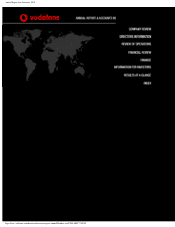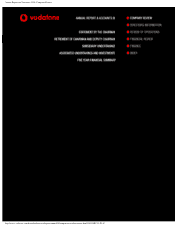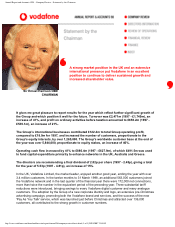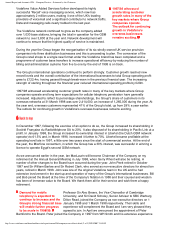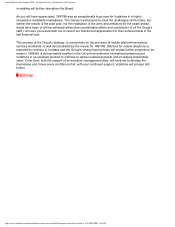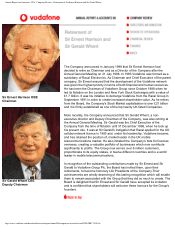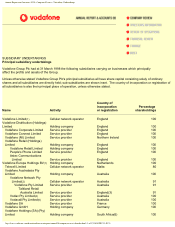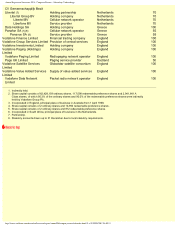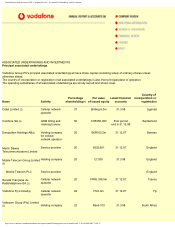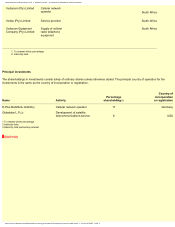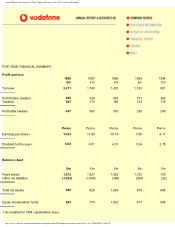Vodafone 1998 Annual Report Download - page 4
Download and view the complete annual report
Please find page 4 of the 1998 Vodafone annual report below. You can navigate through the pages in the report by either clicking on the pages listed below, or by using the keyword search tool below to find specific information within the annual report.
Annual Report and Accounts 1998 - Company Review - Statement by the Chairman
1997/98 witnessed
accelerating customer
growth rates in many of the
key markets where Group
companies operate.
The outlook for continuing
growth in Vodafone's
overseas businesses
remains exciting.
Vodafone Value Added Services further developed its highly
successful 'Recall' voice messaging service, which now has
approximately 2 million users, making it one of the UK's leading
providers of voicemail and a significant contributor to network traffic.
Data and messaging calls nearly trebled in the last year.
The Vodafone network continued to grow as the company added
over 1,030 base stations, bringing the total in operation for the GSM
network to over 3,800 at the year end. Network development will
continue to ensure that the highest quality of service is maintained.
During the year the Group began the reorganisation of its six wholly-owned UK service provision
companies into three distribution businesses and this is proceeding to plan. The conversion of the
Group's retail shops to a single new format under the Vodafone brand has been completed and a
programme of customer base transfers to increase operational efficiency by reducing the number of
billing and administration systems from five to one by the end of 1998 is on track.
The Group's international operations continued to perform strongly. Customer growth reached new
record levels and the overall contribution of the international businesses to total Group operating profit
grew to £122.4m, having passed through break-even in the previous financial year. The increasing
strength of sterling throughout the financial year reduced international operating profits by £20m.
1997/98 witnessed accelerating customer growth rates in many of the key markets where Group
companies operate and long term expectations for cellular telephony penetration have generally
increased. Adjusted to reflect its percentage shareholdings, the Group's share of customers in its
overseas networks at 31 March 1998 was over 2,414,000, an increase of 1,265,000 during the year. At
the year end, overseas customers represented 41% of the Group's total, up from 28% a year earlier.
The outlook for continuing growth in Vodafone's overseas businesses remains exciting.
In December 1997, following the exercise of an option to do so, the Group increased its shareholding in
Société Française du Radiotéléphone SA to 20%. It also disposed of its shareholding in Pacific Link at a
profit. In January 1998, the Group increased its ownership interest in Libertel (the Dutch GSM network
operator) to 61.5% and, in March 1998, increased it further to 70%. Libertel became profitable at the
operating level late in 1997, a little over two years since the start of commercial service. At the end of
the year, the Misrfone consortium, in which the Group has a 30% interest, was successful in winning a
licence to operate Egypt's second GSM network.
As we announced earlier in the year, Ian MacLaurin will become Chairman of the Company on my
retirement at the Annual General Meeting in July 1998, when Gerry Whent will also be retiring. A
number of other changes to the Board have occurred during the year. John Peett retired in October
1997 and Sir William Barlow and Sir Robert Clark, who served as non-executive directors for almost ten
years, retired in March 1998. John was one of the original Vodafone team in the UK and he had
extensive involvement in the start up and operation of many of the Group's international businesses. Bill
and Bob joined the Board at the time of the Company's flotation in 1988 and their counsel and wisdom
has been of immense value to the Board. We thank them all for their service and wish them a happy
retirement.
Demand for mobile
telephony is expected to
continue to increase and the
Group's strong financial base
will enable further progress
to be made in 1998/99.
Professor Sir Alec Broers, the Vice-Chancellor of Cambridge
University, and Sir David Scholey, Senior Adviser to SBC Warburg
Dillon Read, joined the Company as non-executive directors on 1
January 1998 and 1 March 1998 respectively. Their skills and
experience will complement the Board and I am very pleased they
agreed to join. In April we announced the appointment of Peter
Bamford to the Board. Peter joined the Company in 1997 from WH Smith and his extensive experience
http://www.vodafone.com/download/investor/reports/annual98/companyreview/chasta.html (2 of 3)29/03/2007 23:04:59

